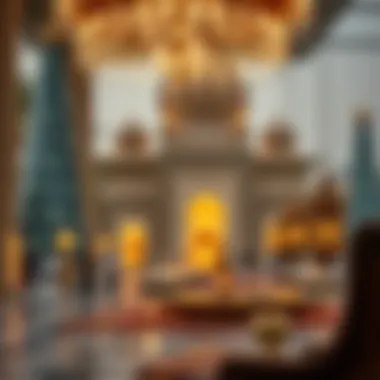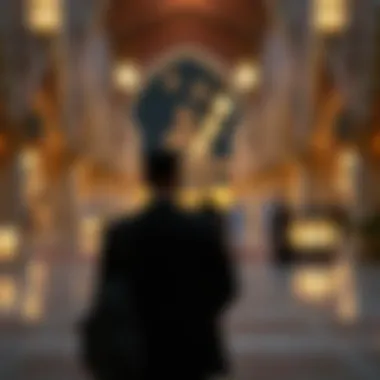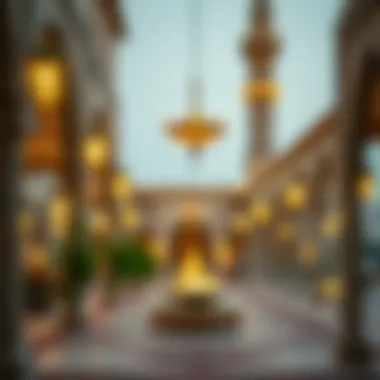Ramadan 2023 in Dubai: Cultural and Economic Insights


Intro
As the crescent moon waxes, Dubai transforms into a city of spirituality and community spirit during Ramadan. This month, observed by millions worldwide, is not just a time for fasting but a season that intertwines faith, tradition, and corporate dynamics. Particularly in a bustling metropolis like Dubai, Ramadan showcases a unique blend of cultures. The economic activity also experiences a noticeable shift, tailored around the rhythm of the holy month.
Understanding the significance and practice of Ramadan in Dubai goes beyond what one might expect. It’s about savoring the rich traditions, embracing ones spirituality, and observing the changes in the landscape of real estate—a topic that undeniably intrigues real estate agents, investors, expatriates, homeowners, and developers.
Whether it's about communal Iftar gatherings, fasting traditions that foster deeper connections, or delving into how this month fosters a robust market for real estate, let’s dive into a thorough exploration of Ramadan 2023 in Dubai. It holds implications that reach far and wide, reflecting not only on cultural practices but also on economic trajectories.
Market Trends and Analysis
Current Market Conditions
During Ramadan, the Dubai real estate sector often sees a shift in market dynamics. As families come together to celebrate and observe, there’s a surge in demand for larger residences that can accommodate extended gatherings. Many investors are paying close attention to areas close to mosques or those known for vibrant community celebrations.
Moreover, the retail space within residential complexes often thrives during this season, as businesses cater to those seeking convenience; thus, properties with mix-use potential continue to attract investor interest. Landlords may also experience a boost as families seek temporary lease arrangements in prime areas.
- Key areas of interest include:
- Downtown Dubai
- Dubai Marina
- Jumeirah Lake Towers
Future Predictions and Growth Areas
Looking ahead, analysts forecast a continuous interest in real estate investments during Ramadan seasons, evidenced by previous years' trends. The spiritual atmosphere attracts global expatriates, further enriching the market with diverse buyer profiles. Developers should focus on creating spaces that amplify community ties along with modern living amenities.
In the ensuing years, there is potential for increased investment in townhouses and villas, reflecting a hint of luxury lifestyle amidst community interactions. Investing in properties that offer spacious living and communal areas can be a lucrative strategy going forward.
The Significance of Ramadan
Ramadan holds a profound significance for Muslims worldwide, and its importance extends into the very fabric of societies where it is prominently observed. It is not merely a month of fasting but represents a time of spiritual reflection, community bonding, and an opportunity for charitable acts. In the context of Dubai, an emirate characterized by its blend of tradition and modernity, the significance of Ramadan transcends religious obligations; it touches on cultural, social, and even economic dimensions.
In this section, we explore the various layers of Ramadan’s significance, particularly focusing on how it offers benefits that resonate on multiple levels.
Understanding Ramadan
At its core, Ramadan is the ninth month of the Islamic lunar calendar, marking the period during which the Quran was revealed to Prophet Muhammad. Fasting during this month is one of the Five Pillars of Islam, which are the essential acts of worship that shape a Muslim's faith and practices. During Ramadan, Muslims abstain from food, drink, and other physical needs from dawn until sunset. This fast serves to cultivate self-discipline, enhance patience, and foster a greater sense of empathy for those in need.
The act of fasting is a means of purifying the soul and promoting mindfulness. This is not just a physical exercise; it is a reflective journey aimed at strengthening one's relationship with God. Additionally, it reminds participants of the privileges they often take for granted, encouraging gratitude and reflection.
Cultural Importance in Dubai
In Dubai, Ramadan brings forth a unique cultural tapestry that blends age-old traditions with contemporary practices. The holy month transforms the city into a vibrant hub of activity, as various elements come together to create a rich atmosphere of spirituality and community engagement.
- Community Gathering: Ramadan fosters a sense of belonging. Families and friends gather for Iftar, the meal to break the fast, often in large groups, reinforcing bonds and relationships. Local mosques become centers of community activity, welcoming everyone to participate in prayers and collective Iftars.
- Culinary Delights: The culinary offerings during this season contribute to the cultural landscape of Dubai. Special dishes and sweets are prepared, with restaurants and hotels rolling out extravagant menus to cater to the demands of iftar enthusiasts. From traditional dates to elaborate buffets, the diversity in cuisine reflects a blend of cultures.
- Charitable Endeavors: Lastly, Ramadan is a time when charitable giving is particularly emphasized. People feel compelled to contribute towards those less fortunate. Organizations offer iftar meals to the needy, and residents often support local charities, enhancing the spirit of giving back.
Ramadan in Dubai is, thus, a time where spiritual, cultural, and social threads intertwine, creating an atmosphere that resonates profoundly with residents and visitors alike. Individuals and communities come together to celebrate not just their beliefs but their shared humanity.
Start Date of Ramadan


Determining the start date of Ramadan holds significant importance not only for Muslims observing the fast but also for various sectors across Dubai. This holy month shapes the rhythm of life in the city, influencing everything from work schedules to communal gatherings. Understanding its start date helps individuals and businesses alike plan accordingly, balancing religious practices with daily routines.
Predicted Start Date
For Ramadan in 2023, it is anticipated that the fasting month will commence on March 23, although the precise start can vary slightly based on lunar calculations. The Islamic calendar is lunar, and the sighting of the moon marks the beginning of Ramadan. Hence, predictions are often reliant on astronomical observations and can differ from one country to another, or even among local communities. It is essential for expatriates and investors to track this date closely, as it impacts numerous events and activities across the city during this sacred period.
Moon Sighting and Its Role
The moon sighting is more than a mere tradition; it stands at the heart of marking Ramadan’s start. The Fatwa Council of Dubai plays a crucial role in this process, where local religious leaders gather to observe the crescent moon. The significance of confirming the sighting can’t be overstated. Many families or communities rely on this single celestial event to kick off their month of fasting, and once the moon is sighted, jubilant announcements swiftly follow.
"The moon might appear to be a simple ball of rock, but for millions, it represents the onset of a time for prayer, reflection, and community."
Besides its religious aspects, the influence of moon sighting affects economic patterns too. For businesses in the hospitality and retail sectors, it allows for planning iftar feasts and promotional campaigns, aligning their sales strategies with the local community’s sentiments and needs during Ramadan.
Understanding these dynamics becomes indispensable for anyone looking to navigate the real estate market or invest in Dubai during this time, where cultural significance merges with economic activity, shaping a unique landscape in the vibrant metropolis.
Ramadan Traditions in Dubai
In the heart of Dubai, Ramadan weaves a vibrant tapestry of traditions, enriching the lives of its residents. These traditions are not just rituals; they signify a communal bond and cultural identity. Understanding these practices can provide valuable insights for real estate agents, investors, and expatriates navigating this dynamic city during the holy month. From fasting to communal meals, Ramadan is a period where social ties strengthen and cultural values shine.
Fasting Practices
Fasting during Ramadan is a cornerstone of the month, observed from dawn until sunset. The act of fasting, or Sawm, is a deeply personal journey and a communal commitment. Muslims refrain from food, drink, and certain physical pleasures, prioritizing spiritual reflection and self-discipline. For expatriates and residents, this can mean adjusting daily routines, as many businesses and workplaces modify their hours.
Notably, during this time, Suhoor, the pre-dawn meal, becomes an important practice. Families often gather early in the day to share this meal, fostering unity and familial bonds. This tradition serves as a gentle reminder of the resilience and endurance that fasting requires. By observing the fast, one taps into the essence of Ramadan—strengthening one’s faith and empathy for those less fortunate.
Communal Iftar Gatherings
As sunset approaches, the energizing spirit of Ramadan kicks in with the tradition of Iftar. This meal, breaking the fast, is often a communal affair. In Dubai, it's common to see families, friends, and even strangers gathering over a table laden with dates, water, and traditional dishes. Visiting different Iftar events can be a delightful way to experience the rich culinary heritage of the UAE.
The congregational aspect of Iftar emphasizes togetherness during Ramadan. Many establishments offer special Iftar menus, making it accessible for those who wish to partake in the tradition without the hassle of cooking. For example, popular hotels, such as the Burj Al Arab or the Atlantis, The Palm, host lavish Iftar buffets that showcase a variety of local and international cuisines. These gatherings are not simply about food; they encapsulate the spirit of generosity and community.
Charitable Giving
An essential aspect of Ramadan in Dubai is the emphasis on Zakat (charitable giving). Beyond the oppressive heat and long fasting hours, Ramadan shines as a season of generosity. Wealthier individuals often reflect on their fortune and share it with those in need, reinforcing a community where everyone looks out for one another.
Local charities and humanitarian organizations create campaigns to encourage donations, which can be various forms—from monetary contributions to food packages. The Dubai Cares initiative, for instance, focuses on providing education for underprivileged children around the globe, embodying the spirit of giving that Ramadan promotes.
"In giving, we receive; this sentiment captures the essence of Ramadan's charitable traditions."
For real estate professionals, understanding Zakat and its implications can offer insights into the ethical considerations of potential clients. Many people align their investment choices with their values, often favoring projects or communities that embrace and promote charitable initiatives.
Ramadan in Dubai is characterized by its rich traditions, enhancing not just the local culture but also the city's international appeal. ✨ Belonging to a community that respects and practices these traditions can contribute to a more fulfilling life in this cosmopolitan hub.
Impact on Daily Life
The month of Ramadan is not just a spiritual pillar for Muslims but also a period that influences the daily lives of everyone in Dubai, whether they observe the fast or not. The impact of Ramadan can be seen in various aspects of everyday life, particularly in how society operates and interacts. A unique blend of tradition and modernity characterizes this holy month, affecting workplaces, communities, and various cultural events. The atmosphere changes, and so do the rhythms of daily life.


Workplace Adjustments
In Dubai, workplaces adjust their schedules to accommodate fasting employees. Employers often implement shorter working hours during Ramadan. For instance, it’s common to see shifts reduced to six hours instead of the usual eight or nine. This is not merely a concession; it’s a legal requirement outlined by the UAE's Labour Law.
The emphasis on understanding and adaptation extends beyond mere scheduling. Teams and colleagues engage with each other in a more accommodating manner. Meetings might be restructured to cater to those who are fasting. Lunch hours become social gatherings, with many choosing to participate in iftar, the meal that breaks the fast after sunset, either in the office or at nearby restaurants.
This adjustment also presents a unique opportunity for employers to show compassion and unite employees regardless of religious beliefs. Many companies promote cultural awareness, providing information about Ramadan processes and traditions, fostering a deeper respect among teams.
Cultural Events and Activities
Public Celebrations
Public celebrations during Ramadan add a lively character to Dubai’s cultural tapestry. From the beautiful decorations adorning streets to vibrant evening markets, the atmosphere becomes festive. Unique to these gatherings is the Ramadan Night Market, where families and friends come together to shop, indulge in local cuisines, and enjoy entertainment options such as live music or traditional performances.
These celebrations serve as a bridge for the community. Residents of different backgrounds come together to celebrate. Often, special events are organized, like outdoor cinemas and art exhibitions, which showcase local talent and captivate both locals and expatriates. It’s a chance for everyone to experience a part of Ramadan in a shared space, enriching the cultural dialogue within the city.
However, there are considerations. While the festivities arouse excitement, they can also attract large crowds. This influx sometimes leads to long waits for food or congestion in popular gathering spots, which can frustrate attendees.
Arts and Culture During Ramadan
The arts and culture landscape in Dubai during Ramadan is vibrant and engaging. Artists often draw inspiration from spiritual themes, presenting their works in galleries and public spaces. Complementing this artistic endeavor are performances that embrace the values of Ramadan.
One of the highlights is the Ramadan Arts Festival, which showcases contemporary artistic expressions while also respecting the holy month’s significance. The festival becomes a platform for dialogue and creativity, allowing local and international artists to express their interpretations of Ramadan.
A particularly unique feature of this cultural aspect is the blend of traditional and contemporary forms of art. An array of programs might include storytelling sessions, poetry readings, and workshops tailored to different age groups. This initiative promotes not only engagement with the broader community but also serves to educate others about Ramadan's essence with a touch of modernity. Yet, this aspect could also pose challenges; some might find the mix of traditional and modern forms jarring or confusing, and balance is paramount.
The convergence of these festivities, adjustments, and celebrations significantly shapes daily life during Ramadan in Dubai. This period affords a unique lens through which to explore not just the observance of faith but also the rich tapestry of collective experience in a multicultural urban setting.
Ramadan's Economic Influence
Understanding the economic ramifications of Ramadan is crucial, particularly in a vibrant hub like Dubai, where this holy month exerts a significant influence. The entire city shifts into a different rhythm, and this change resonates through various sectors of the economy.
Real Estate Market Dynamics
Ramadan has distinct effects on the real estate market in Dubai. In the real estate landscape, several patterns can be observed. The first thing that comes to mind is that many expatriates and locals flock to the Emirate to enjoy the offerings of the month. This influx creates a surge in demand for both rental properties and commercial spaces, especially those that can host iftar gatherings or Ramadan-related events.
- Rental Prices: During Ramadan, landlords often adjust their rental prices due to increased demand. Properties near mosques or popular retail spots see a notable uptick in occupancy rates. This can lead to a rise in rental prices, making it a prime time for landlords to capitalize on the demand.
- Commercial Spaces: With increased foot traffic around shopping districts during Ramadan, many businesses seek to expand or enhance their presence. Retailers often look for short-term leases in bustling areas to cater to shoppers visiting for evening prayers and iftar. This dynamic requires property owners to be flexible with lease agreements to attract tenants eager to take advantage of the month’s economic opportunities.
Moreover, many Dubai projects tend to align their launch dates with the Ramadan calendar. Developers find this timing advantageous to appeal to potential buyers, especially with the emphasis on community and family during this period.
Consumer Spending Patterns
When it comes to consumer behavior during Ramadan, there's a noticeable shift towards community and celebration. The patterns surrounding spending reveal that consumers are more inclined to indulge during this month, investing in food, gifts, and experiences.
- Food and Beverage Sector: Iftar gatherings lead to increased spending on food and beverage. Many residents go all out during this time, splurging on meals to break their fast, leading to busier restaurants and catering services.
- Gift-Giving: There's also a notable rise in gift-giving, both among family and friends. The tradition of exchanging gifts drives purchases of everything from traditional sweets to electronics, and this demand can boost local businesses significantly.
Ramadan’s spirit of generosity encourages higher spending. The focus shifts from individual consumption to communal sharing, affecting how businesses approach their marketing strategies.


- Luxury Goods: Interestingly, the luxury goods sector sees a dip initially, but this rebounds as the month progresses, especially closer to Eid. Shoppers often save up to splurge on luxury items as they prepare for the festive end of Ramadan.
The synergy between Ramadan practices and economic behavior highlights the holy month as a double-edged sword—personal reflection and societal spending both playing their parts.
Navigating Dubai Real Estate During Ramadan
Understanding the nuances of the real estate market in Dubai during Ramadan is essential for buyers, sellers, and investors alike. This period not only shapes the culture and community practices but also influences the dynamics of the property sector in significant ways. Ramadan offers unique opportunities, but it also comes with its own set of challenges. It's crucial to grasp how different practices and sentiments during this holy month can affect real estate transactions and investment strategies.
The significance of navigating Dubai's real estate during Ramadan arises from the month being a time of reflection, community, and often, a slower pace in business activities. However, it also serves as a peak period for certain types of transactions, particularly in residential and commercial sectors. Identifying market trends allows stakeholders to make informed decisions that capitalize on the unique atmosphere of the season.
Market Trends to Observe
The real estate market in Dubai during Ramadan experiences certain trends that differ from other times of the year. One notable trend is the slowdown in transactional activity during the day, coinciding with fasting hours. People are more focused on their spiritual obligations and family gatherings, which means fewer viewings and negotiations occur until sunset. However, post-Iftar hours can see an uptick in interest, especially as individuals rush to seize opportunities that present themselves during this time of communal togetherness.
Another trend is the increased focus on rental properties, especially in areas close to mosques and community hubs. Many expatriates and locals seek short-term accommodations to facilitate their Ramadan observances, making these properties sought after. Moreover, there's often a heightened demand for family-sized units due to traditional communal meals enjoyed during the month.
Investment Opportunities
Residential Properties
When it comes to residential properties, there is a clear trend towards family-oriented housing solutions during Ramadan. Many families in the expat community look to secure larger accommodations where they can host Iftar meals and gatherings with friends and family. Notably, properties offering spacious dining areas and proximity to mosques are particularly appealing during this time.
The allure of these residential properties lies in their ability to create a comfortable environment conducive to family and community gatherings. Additionally, the surge in demand for these types of homes can lead to favorable negotiation conditions for the seller.
However, potential investors should also note that prices may peak during Ramadan due to increased interest. It's important to weigh the advantages of a high-demand season against potential market corrections post-Ramadan.
Commercial Ventures
On the commercial front, Ramadan opens several lucrative avenues for businesses, particularly in sectors such as hospitality, food service, and retail. Companies that offer products or services that cater to the needs of families during Ramadan witness a spike in demand. Restaurants and food markets, in particular, see an influx of customers looking to break their fast with diverse and sumptuous meals.
Investing in commercial properties that are aligned with these needs can yield profitable returns. The unique feature of having strategic locations—places that enjoy a high footfall during evenings—creates valuable opportunities for investment. However, investors must remain cautious, as the demand can fluctuate based on changing consumer preferences and economic conditions.
Investing in commercial properties tailored for Ramadan can be profitable, but it requires thorough market analysis and understanding consumer behaviors during this month.
Final Thoughts
The conclusion of this article brings us to reflect on the multifaceted significance of Ramadan in Dubai. This holy month is not just a time for spiritual reflection and fasting; it deeply influences cultural dynamics and economic activities across the city. Understanding these layers allows real estate agents, investors, expatriates, homeowners, and developers to make informed decisions that align with the unique fabric of Dubai’s society during this period.
The Lasting Impact of Ramadan
Ramadan's lasting impact in Dubai extends beyond the immediate month of fasting. With its emphasis on community and generosity, it shapes the social landscape and promotes deeper connections among residents. Here are some consequential points:
- Cultural Integration: Ramadan fosters a sense of togetherness among people from various backgrounds. This unity is crucial in a diverse city like Dubai where expatriates constitute a large part of the population. It promotes an understanding of cultural sensitivities, which can improve interpersonal relations throughout the year.
- Economic Contributions: The economic activities associated with Ramadan, such as increased consumer spending during Iftar dinners and charity drives, stimulate various sectors. This season presents opportunities for businesses, notably in real estate, where the demand may rise for properties offering communal and family-friendly spaces.
- Community Engagement: The prevalence of charitable activities, from food drives to fundraising events, cements bonds within communities and enhances the quality of life for many. This resonates with the values of potential investors looking to develop properties that cater to a sense of community and support.
"Ramadan serves as a reminder that real estate is not just about properties—it’s about people, their values, and their connections."
Anticipating Future Ramadans
Looking ahead, the economic and social trends observed during Ramadan are likely to evolve, influenced by both global situations and local factors. Here are key considerations:
- Adapting Business Models: Businesses may need to adapt their models as consumer behaviors shift year on year. Observing how expenditures during Ramadan change can help stakeholders in the real estate sector to make strategic decisions.
- Cultural Sustainability: As Dubai continues to expand, there is an increasing need to preserve the cultural essence of Ramadan. Future developments should consider integrating spaces that promote cultural celebrations and gatherings, creating a balance between modern living and traditional practices.
- Real Estate Adaptation: With predictions of fluctuating market conditions, real estate professionals should keep an eye on emerging properties that align with the community's evolving needs during Ramadan. Homes designed with family spaces for Iftar gatherings or areas for charitable activities can attract buyers who cherish these values.
In essence, as we move forward, it’s crucial for stakeholders in Dubai’s real estate market to keep the spirit and lessons of Ramadan at the forefront of their strategies. The bond created during these sacred weeks can influence the real estate landscape in years to come, marking an evolution shaped by cultural respect and understanding.











